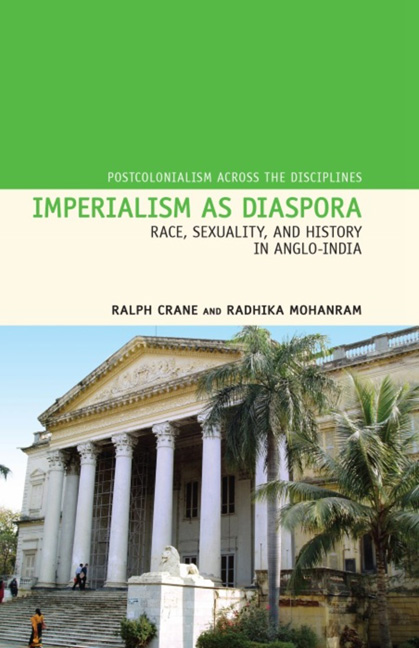Book contents
- Frontmatter
- Contents
- List of Illustrations
- Acknowledgements
- Introduction: Race, Gender, and Diaspora: Explorations of Anglo-India
- 1 Masculinity Forged Under Siege: The Indian Mutiny of 1857
- 2 The Terrains of Identity: Mimicry and the Great Game
- 3 The Missionary's Position: Love and Passion in Anglo-India
- 4 The Laws of Desire: Intimacy and Agency in Anglo-India
- Epilogue: Imperialism as Diaspora
- Bibliography
- Index
2 - The Terrains of Identity: Mimicry and the Great Game
- Frontmatter
- Contents
- List of Illustrations
- Acknowledgements
- Introduction: Race, Gender, and Diaspora: Explorations of Anglo-India
- 1 Masculinity Forged Under Siege: The Indian Mutiny of 1857
- 2 The Terrains of Identity: Mimicry and the Great Game
- 3 The Missionary's Position: Love and Passion in Anglo-India
- 4 The Laws of Desire: Intimacy and Agency in Anglo-India
- Epilogue: Imperialism as Diaspora
- Bibliography
- Index
Summary
Between the end of the Mutiny and the beginning of the twentieth century, from 1858 to 1905, the British Raj in India, according to Denis Judd, was at its zenith (91). In 1858, the rule of India passed from the hands of the Honourable East India Company to those of the British Crown, and, in 1877, Queen Victoria was proclaimed Empress of India, ushering in a renewed belief in the Empire some twenty years after the shock of the Indian Mutiny. This 'era of confidence', as Allen J. Greenberger terms it in The British Image of India, is clearly reflected in the literary outpourings of Anglo-India during the final decades of the nineteenth century. Greenberger explains that:
In order to rule, the novelists believed it was necessary for an individual to be British and to possess certain characteristics which were felt to be natural to that ‘race’. The ideal British hero of this ‘era of confidence’ as well as the protagonist of fiction was brave, forceful, daring, honest, active, and masculine. (11)
In other words, in John Tosh's terms, the British hero exhibits ‘manliness’ - which David Newsome concludes was ‘one of the cardinal Victorian virtues’ (195) - rather than ‘gentlemanliness’. In the previous chapter, we argued that the re-signification of masculinity was initiated as much by the Mutiny as it was by imperialism and diaspora.
Consequently, the British image of India in popular fiction of the period is of a place ripe with adventure and romance (or perhaps the romance of adventure). Almost all of the novels set in India during the late Victorian period, from 1880 onwards, fall within the tradition of romantic adventure fiction, a form made popular by such writers as G.A. Henty - who, as Nancy Paxton notes, ‘developed one of the most influential formulas for the marketing of British history as the raw material for mass-produced adventures for boys’ (140): stirring tales of British valour and ‘derring-do’, populated by dashing young heroes serving the Raj in countless skirmishes in the Punjab or on the Frontier. As Greenberger notes:
virtually all the novels of this period are set in north-western India – the Punjab, North West Frontier Province, and Himalayan foothills. There are a few cases where the locale is Maharashtra or Burma, but Bengal, Central, and South India are almost completely absent.
- Type
- Chapter
- Information
- Imperialism as DiasporaRace, Sexuality, and History in Anglo-India, pp. 55 - 82Publisher: Liverpool University PressPrint publication year: 2013



